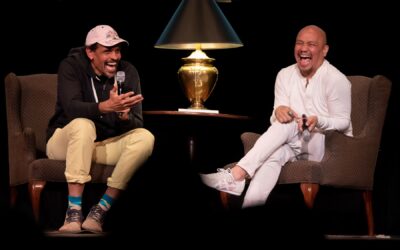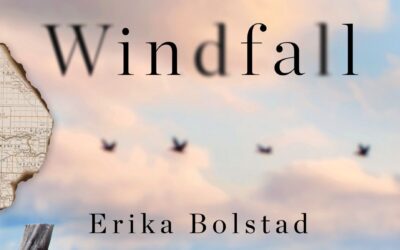Oddball Hoedown, an up-and-coming, gender-inclusive folk-dance organization in Kansas City, Missouri, hosted their inaugural event on an unseasonably warm February night at 9th & State. Built in 1911 by Pabst Brewery in West Bottoms on the “wettest block in the world,” the infamous venue has a captivating history. Its deep ginger brick walls and mosaic tiled floors have held a speakeasy catering to roughnecks, cowboys and meatpackers; a jazz club that hosted Charlie Parker and Buster Smith; and a variety of contemporary bars and galleries, including BDSM Club IX and punk underground scene Negative Space. The Oddball Hoedown sold out and, for the evening, transformed the building into yet another locale: a contra dance hall.
Oddball Hoedown calls upon an intergenerational dance tradition hailing from Europe and popularized in the so-called United States. Contra associations, organizations and enthusiasts from Charleston Folk to Portland Country Dance Community agree that “contra dancing is social interaction, meeting people and making new friends, set to music. The rest is just details.” European colonists brought contra to Turtle Island where it became known as New England or Appalachian folk dance or, most commonly, barn dance. Contra, although undoubtedly influenced by indigenous dance from both Turtle Island and West Africa, remains a pillar of Euroamerican ancestral culture.
Contra dances are inviting to beginners as there is a lesson before the dance commences. In the gender-flexible tradition of LGBT+ square dance clubs, Oddball Hoedown attendees were given the choice to be a Robin or a Lark (rather than lady or gentleman). No partner was required for attendance and with 75 folks adorned in blue-collar boots, cowboy hats and jeans, stylized with everything from corset modifications to floral embroidery, none were left wanting.
It was against this backdrop that our caller Charlie Myers oriented us to the space and structure of the evening. The lesson was characterized by repeated attempts to redirect the mostly-millennial, city-folk crowd’s giddy distractedness and capture the audience’s “listening ears.” The dynamic reflected varying levels of buy-in and felt indicative of a general discomfort with trying, failing and persevering. The lesson, scheduled for an hour, went over twice as long. Unfortunately, this meant that by the end of the night, the band Halfsider — Tricia Spencer, Howard Rains, Rachel Krause and 2022 Kansas State Fiddle champion Isaiah Sibi — hardly had a chance to play an entire song, let alone a curated set fashioned for continuous dancing. The bar was open for patronage and there was no shortage of dynamic outfits to compliment, which greased the wheels of social interaction. However, genuinely meeting new people was limited as we remained much in the same place and order for the majority of the evening.
In barn dance mutual aid tradition, Kansas City improvisational quilter Nathan Ford raffled two textiles to raise funds for KC Tenants, a citywide coalition of tenant unions advocating for safe, affordable, equitable housing in the face of discrimination and gentrifying development. KC Tenants was a pertinent cause as LGBT+ individuals are 120% more likely to experience houselessness than non-LGBT+ individuals and 20% have or will experience houselessness. At the time of the event, the conditions that create this disproportionate struggle were augmented by 340 anti-LGBT+ bills percolating through the nation. One-hundred and fifty of those bills target trans people, the most anti-trans bills ever filed in the US. Revitalizing LGBT+ social spaces and building our capacity to materially support one another is a tactic of resistance. Barn dances have long been sites that materially empower communities through fundraising, collective movement and social inclusion regardless of age, skill or ability.
With this sociopolitical context and at a gender-inclusive folk dance, Ford’s off-kilter textiles evoked the AIDS Memorial Quilt. However, antithetical to the optics of the quilts and the event being advertised as “inclusive” for “people of all identities and abilities,” COVID vaccinations were not checked at the door nor were masks required. It was haunting to watch a community fundamentally altered by the ongoing HIV/AIDS crisis perpetuate another health crisis that disproportionately affects the most marginalized in our community.
In the U.S., as the homogenizing fist of fascism tightens its grip, capitalist alienation and technological isolation are underscored by an uptick in highly-visible state-sanctioned and intercommunity violence. It is essential to cultivate deconstructionist, historically-informed ancestral reconnection that seeks to undo and resist assimilation and oppression. Contra dancing, especially when inclusive to the LGBT+ community, is a ripe opportunity to enter Euroamerican ancestral practice and reframe aestheticization and depoliticization of Americana. Further, the synchronous, communal nature of contra provides an opportunity to shed shame about our bodies and coregulate our nervous systems in step with one another.
I hope that, as people critically engage with communal dance spaces like the Oddball Hoedown, we have the opportunity to truly, inclusively dance, laugh and struggle together. I hope to see more masks, meet more elders and hear more music. I hope that the Oddball Hoedown continues to become a space that builds trust and community such that we may dance into the future, together.
Follow @Oddball_KCMO on Instagram
for updates on future dances and check out
Crosscurrents Barn Dance on Facebook for more
Kansas City area events.



